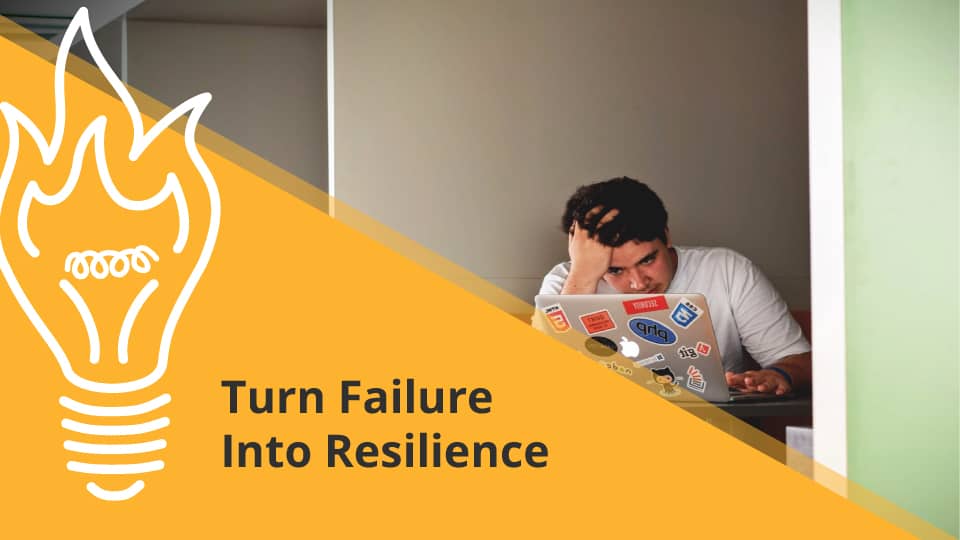Fund raising failure can be tough. Startup founders, throughout their fund-raising and early marketing activities, often hear the dreaded word “no.” Hearing “no” is not only demoralizing, it can be debilitating to morale. How can you get this company going, if you keep hearing “no?” Not to mention the dozens of other stressors, risks, and failures inherent to entrepreneurship. Emergencies created by cash flow issues only exacerbates the problem, as funding needs become more urgent for the budding founder. That single word—or rather, the fear of it—is probably responsible for most potential founders staying in the corporate world.
Keeping yourself energized and motivated in the face of No, and other types of failure, is one of the hardest jobs as a leader and entrepreneur. In the startup world, lack of structure and constant chaos abound. This rapid-pace environment is responsible for high highs, but also the lowest of lows. It’s what makes the entrepreneurial life loved by some and detested by so many others. And no matter your strength, time and pressure will eventually bring you to your knees. This is where experience can help. But for the inexperienced, or those who need a refresher, the team at Pitch Deck Fire is here to offer some tips on navigating your startup’s fund raising failure events.

Most of us are probably so used to operating in this heightened stress mode that it seems natural at this point. When people talk about the benefits of things like mediation and guided relaxations, they are usually describing the act of unwinding. Unwinding from the stress that all the day-to-day creates for you. But there are healthy and unhealthy ways of unwinding.
First: How Not to Deal with Stress
Destructive ways of coping with problems usually just end up creating new ones. Stress eating or overindulgence in alcohol or other drugs to “relax” will actually put even more strain on the body. Moreover, the use of stimulants or depressants is likely to dull our awareness of our actual stressors. Over time, your original problems can become even larger.
Finding the Root Causes
The work environment of an entrepreneur often lacks stability. Managing stress levels over the long term will be challenging. Staying ahead of this natural tendency towards chaos is one of our most important tasks as entrepreneurs. Be proactive! Anticipate challenging situations, and build solid processes around routine activities. These simple steps are the keys to your ability to manage stress. Good systems help you stay above the stressors, plan around them, communicate solutions, and effectively look at challenging situations in a more positive light. After all, we don’t want delivery to fail when we have customers counting on us!
Staying Grounded
Every new situation is a chance to learn more about yourself and your business. The heart of an entrepreneur’s relationship to their business is the marriage of the creator to the delivery mechanism. The founder and business bring out the best and worst in each other. The business hones the founder’s abilities and skill sets, and brings out the best in their teams. The founder’s behavioral evolution will be shaped largely by how they act in the early stages of product development, and the surrounding sales and marketing efforts. Early investor engagement strategy will ultimately determine how the founder will engage with customers.
With the right strategic approach from the beginning, the founder can better predict fund raising failure points and minimize exposure to risk. Every new situation is a chance to learn and improve the engagement approaches. With rigor and focus, you will start to see trends and determine the success factors that must guide your interactions. This iterative learning and ability to gain scale should make failure a natural predecessor to success. So think back: how has a past failure saved your ass for the future, when it could’ve really hurt? How will solving your current problems reduce stress on the same issues next time around?
Positivity is just a mind-set. Really staying resilient and avoiding burnout is about being realistic. After all, the highs and lows of entrepreneurship will be less dramatic—and less stressful—if it’s all framed as a learning experience, instead of “winning” versus “losing.” Losing is a frame of mind. If you are learning, you can’t be losing. But if you are making the same mistakes over and over again, you might not be learning the things that will help you move forward into a better place.
Take Charge
Where are you holding yourself back? I guarantee there is an answer to this question, and it probably lies in that one task that is scaring the shit out of you. It’s okay to feel stressed about tasks you don’t like. It’s also okay to feel stressed about things you don’t know how to do. But it’s not okay to avoid addressing either of those things.
Taking charge means that you know you need to get it done, whether or not you want to do it or know how to do it. This is where good resources and books come in handy. There is so much knowledge available, on almost every topic, that you are holding yourself back if you aren’t learning more, or encouraging someone else on your team to do so. Taking charge means knowing that if someone else can do it, you probably can too. It might not be as good, but you can work on making it better over time.
Keeping the focus on your personal development—and the team’s—can help improve overall confidence. And guess what? Confidence is a great way to reduce stress. Especially when it’s not based on an inflated sense of ego, but rather solid knowledge. Remember, every problem shows us where we can make things better for us, our employees, and our customers.
Learning from Obstacles
Why is this setback happening? Is there an underlying reason or cause you can point to? Could you have done anything differently to change the outcome of the situation?
It’s critical to get to the point where you can positively look forward into what needs to change for next time. This will keep the organization focused on the right things. Blame and assigning guilt based on fund raising failure points doesn’t create an environment where open thought and experimentation are encouraged. Instead, encourage your team to embrace failure and own the underlying processes, so they too can use failure as a learning tool.
Fund Raising Failure is Relative
Early failures can be debilitating, but as you systematize your business and operate with a more effective strategy, you’ll notice that failure is relative. Small failures at a more mature company are more unacceptable than they will be at a startup. Staying positive can mean embracing that failure will always be part of business and life. Failure makes us stronger, makes vacations (or at least home) more enjoyable, and ultimately makes our business and teams more resilient if we can deal with it successfully. Besides, you might as well embrace it, because good problems are still problems, and failure is always just around the corner.
But you can overcome failure. This doesn’t mean you’ll reach a point where you never fail again—it means you’ll have a mindset and systems in place to work through it. You can have a flexible business strategy that helps you overcome up and down cycles smoothly and have the right scalability through the right systems. It is possible to have the right team of cross-functional experience and skills to help you overcome even the largest business challenges. It is possible to build an attitude of accepting reality, and the ability to take responsibility for the failure point. Fail points are met with a clear plan and follow-through, to ensure the process and systems will support successful execution going forward.
Because ultimately, that’s what fund raising failure really is—a point to move forward from.







